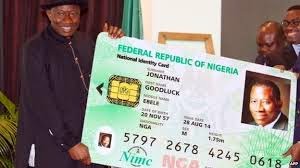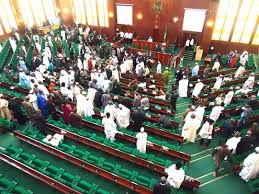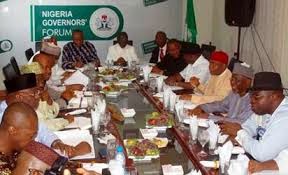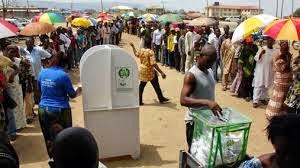
OFFENCES ON ELECTION DAY
 |
| Credits – thisisafrica.me |
Yippee, elections are
finally here after the 6 week postponement and all the campaignwahala debates,
rallies and mud-slinging electioneering.
Obviously, the Presidential elections will
be a battle majorly between Goodluck Jonathan and Buhari while other state
governorship and national assembly elections will have various contestants from
other political parties who are not with the PDP or the APC have some political
ground.
finally here after the 6 week postponement and all the campaign
rallies and
Obviously, the Presidential elections will
be a battle majorly between Goodluck Jonathan and Buhari while other state
governorship and national assembly elections will have various contestants from
other political parties who are not with the PDP or the APC have some political
ground.
As we all go out to cast
our votes, it is very important that we embrace peace and a free and fair election
procedure, please do not cause or promote anykatakata disorderly acts and
if you insist on doing so, kindly remember that “any person who at an election
acts or incites others to act in a disorderly manner commits an offence and is
liable on conviction to a maximum fine of N500,000.00 or imprisonment for a
term of 12 months or both” – Section 128 of the Electoral Act. So the
ball is in court, peaceful election on one hand and one year in prison with a
fine on the other, please choose wisely.
our votes, it is very important that we embrace peace and a free and fair election
procedure, please do not cause or promote any
if you insist on doing so, kindly remember that “any person who at an election
acts or incites others to act in a disorderly manner commits an offence and is
liable on conviction to a maximum fine of N500,000.00 or imprisonment for a
term of 12 months or both” – Section 128 of the Electoral Act. So the
ball is in court, peaceful election on one hand and one year in prison with a
fine on the other, please choose wisely.
There are many other
things you shouldn’t be caught doing on Election Day, these are stated in Section 129 of the 2010 Electoral Act, and
the law provides that:
things you shouldn’t be caught doing on Election Day, these are stated in Section 129 of the 2010 Electoral Act, and
the law provides that:
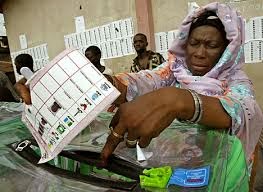 |
| Credits- dailypost.ng |
– No person shall on the date on which an
election is held do any of the following acts or things in a polling unit or
within a distance of 300 meters of a polling unit –
election is held do any of the following acts or things in a polling unit or
within a distance of 300 meters of a polling unit –
a.
Canvass for votes;
Canvass for votes;
b.
Solicit for the vote of any voter;
Solicit for the vote of any voter;
c.
Persuade any voter not to vote for any
particular candidate;
Persuade any voter not to vote for any
particular candidate;
d.
Persuade any voter not to vote at the
election;
Persuade any voter not to vote at the
election;
e.
Shout slogans concerning the election;
Shout slogans concerning the election;
f.
Be in possessionof any offensive weapon or
wear any dress or have any facial or other decoration which in any event is
calculated to intimidate voters;
Be in possessionof any offensive weapon or
wear any dress or have any facial or other decoration which in any event is
calculated to intimidate voters;
g.
Exhibit, wear or tender any notice, symbol,
photograph or prty card referring to the election;
Exhibit, wear or tender any notice, symbol,
photograph or prty card referring to the election;
h.
Use any vehicle bearing the colour or
symbol of a political party by any means whatsoever;
Use any vehicle bearing the colour or
symbol of a political party by any means whatsoever;
i.
Loiter without lawful excuse after voting
or after being refused to vote;
Loiter without lawful excuse after voting
or after being refused to vote;
j.
Snatch or destroy any election materials,
and
Snatch or destroy any election materials,
and
k.
Blare siren.
Blare siren.
But that’s actually not
all, as the law further states that no one within the vicinity of a polling
unit or collation centre on the day of election should convene, hold or attend any public meetings
during the hours of polling, unless appointed to make official statement,
neither shall anyone carry any badge, poster, banner, flag or symbol of any
political party. Any person who
contravenes any of the provision of this section commits an offence and is
liable on conviction to N100,000.00 or imprisonment for 6 months. Moreover, anyone who destroys or snatches
election material is liable to imprisonment for 24 months. I look forward to the
results of the elections and I am sure you do as well. While we wait, do share
this blog with everyone you know who will be voting on Election Day or will be
coming out to watch the polling.
all, as the law further states that no one within the vicinity of a polling
unit or collation centre on the day of election should convene, hold or attend any public meetings
during the hours of polling, unless appointed to make official statement,
neither shall anyone carry any badge, poster, banner, flag or symbol of any
political party. Any person who
contravenes any of the provision of this section commits an offence and is
liable on conviction to N100,000.00 or imprisonment for 6 months. Moreover, anyone who destroys or snatches
election material is liable to imprisonment for 24 months. I look forward to the
results of the elections and I am sure you do as well. While we wait, do share
this blog with everyone you know who will be voting on Election Day or will be
coming out to watch the polling.
Adedunmade Onibokun
@adedunmade/twitter
Adedunmade Onibokun is a legal
practitioner, publisher and blogger based in Lagos, Nigeria. He holds an LLM in
International Business Law from the University of Bradford and publishes the
Nigerian law blog Legalnaija.
practitioner, publisher and blogger based in Lagos, Nigeria. He holds an LLM in
International Business Law from the University of Bradford and publishes the
Nigerian law blog Legalnaija.

